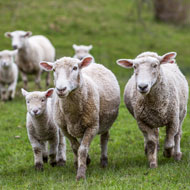Thousands sign sheep worrying petition

Last Spring saw repeated incidents of irresponsible dog owners allowing livestock to be killed or maimed by their dog.
A petition calling for tougher action on livestock worrying has been signed by more than 4,000 people.
The #TakeALead Petition comes as NFU Scotland proposes several legislative changes to tackle the problem of dog attacks on sheep.
The Union said last Spring saw repeated incidents of irresponsible dog owners allowing livestock to be killed or maimed by their dog. The cost of this, according to leading rural insurer NFU Mutual, has reached a record level of £1.6 million across the UK.
In May, NFU Scotland wrote to the Scottish government with five areas it believes deserve inclusion in any new framework of guidance.
“Despite a vast amount of awareness raising, livestock worrying remains a blight on Scottish livestock farming,” said Martin Kennedy, Vice President of NFU Scotland. “Dogs themselves are not to blame, it's their irresponsible owners who need to wake up and understand the devastation this is causing.
The five key asks designed to tackle the ongoing blight of livestock worrying are:
• Livestock worrying becomes a recordable crime to allow for accurate measurement and monitoring of the issue and provide easy identification of repeat offenders.
• An update of the Scottish Outdoor Access Code (SOAC) is needed to provide clearer guidance on accessing the countryside with dogs
• Police Scotland should be provided with powers to issue Dog Control Notices. Currently, only local authority dog wardens have the power to issue Dog Control Notices, and as a result, this mechanism is often unused.
• Police Scotland should have powers to obtain evidence, seize dogs and have dogs destroyed. These powers will assist in investigations and will prevent dogs from remaining in the custody of irresponsible owners – which experience has shown often results in a repeat offence.
• Fines levied on offenders must be proportionate and full compensation should be provided for.
“We will engage strongly with the legislative process to ensure robust enforcement, and as always, we urge our members to continue to report all incidents of livestock worrying to Police Scotland,” said Martin Kennedy.
The petition was started by MSP Emma Harper at the Royal Highland Show on Thursday, 21 June. Recently, the South Scotland SNP announced that she will bring forward a proposal for a Private Members Bill.
In addition to the petition, more than 100 people completed a questionnaire which showed only 47 per cent of livestock worrying incidents were being reported to the police.



 The RCVS has announced a new version of its 1CPD mobile app, with enhanced features for veterinary surgeons and veterinary nurses to record their continuing professional development.
The RCVS has announced a new version of its 1CPD mobile app, with enhanced features for veterinary surgeons and veterinary nurses to record their continuing professional development.